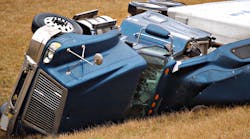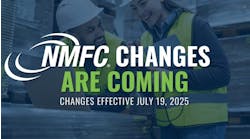Ever watch a basketball game and notice the player who sits on the offensive side of the court looking for easy baskets? Basketball, soccer, or even hockey fans may recall instances of cherry-picking for easy, non-contested points. Interestingly, this is what comes to mind when you see the media go on about our industry's latest crash numbers from 2021.
These crash numbers or even the reported fatalities are disappointing by any revelation, and as an industry, we mourn the loss of any life on our nation's highways. While it appears that the game has changed somewhat, we should acknowledge that our industry—specifically the Federal Motor Carrier Safety Administration—has entered the game of determining whether these crashes were preventable.
The thought came to me in April after FMCSA proposed changes to its Crash Preventability Determination Program (CPDP) that would allow more crashes to be submitted for review on accidents that may or may not have been the driver's fault. In other words, FMCSA acknowledges that the issue of preventability or nonpreventability certainly plays a role in these accidents.
The industry has failed to demonstrate where the accountability for these accidents lies year after year, so it's easy not to think about these numbers. As an industry, we know the numbers, we read press releases, and we strive to improve our safety performance. But since the inception of CPDP, the number of nonpreventable crashes has really been adding up—and they are not small ones, either.
CPDP has reviewed a large number of accidents since May 2020. Would you believe that a total of 43,581 accidents were submitted for review since then? Of those, almost 28,000 were determined to be nonpreventable. The law defines a nonpreventable accident as any occurrence involving an accident/incident despite having taken every reasonable precaution to prevent it.
See also: Heller: Is there a better way to govern HOS?
Even FMCSA acknowledges this very fact by creating this program and allowing carriers to submit a Request for Data Review (RDR). They developed 10 categories that encompass multiple scenarios within which accidents may fall into and for which, as industry experts, they acknowledge the issue of preventability would arise.
FMCSA is even proposing an additional four types for consideration, realizing that no-win situations for the professional truck driver are vast and ever-present. The proposal includes a catch-all type of scenario that would be wholly supported by video, a tool that 10 years ago was not nearly as common as it is today. Sharing the road with our four-wheel passenger car partners is no easy task.
Professional truck drivers have earned the title of "most well-trained driver on our roads today," but they often are placed in situations where nothing could have been done to prevent accidents. According to data and RDR submissions by motor carriers, this scenario has occurred nearly 28,000 times over the past three years.
Make no mistake, determining preventability is not a slam dunk. Just because an accident is submitted does not guarantee a nonpreventable determination. Any and all information in support of the case in question will be appreciated, and FMCSA will communicate its findings to the carrier involved. The caveat here is that FMCSA won't make determinations without industry submissions, and in their defense, they shouldn't have to.
In most cases, motor carriers own exclusive rights to much of the information that gets submitted. Having said that, it is the responsibility of each carrier to provide information on the crashes that are being investigated. If FMCSA is unaware of the preventability question, it cannot possibly make a determination, another version of the you-can't-win-if-you-don't-play mentality.
Once the determination has been made, we will need to discuss how nonpreventability and overall crashes relate to each other and our industry's reporting of highway crashes. In trucking, the best carriers are using any and all data to make drivers safer, using real scenarios as coaching opportunities to improve their safety performance. To determine what practices actually make a difference, they rely on facts to demonstrate either their safety improvement or setbacks.
We should not expect anything different from those who govern. Now that the game has changed, we have the opportunity to actually tell the whole story. All we need to do is tell it.
David Heller is the senior vice president of safety and government affairs at the Truckload Carriers Association. Heller has worked for TCA since 2005, initially as director of safety, and most recently as the VP of government affairs.




